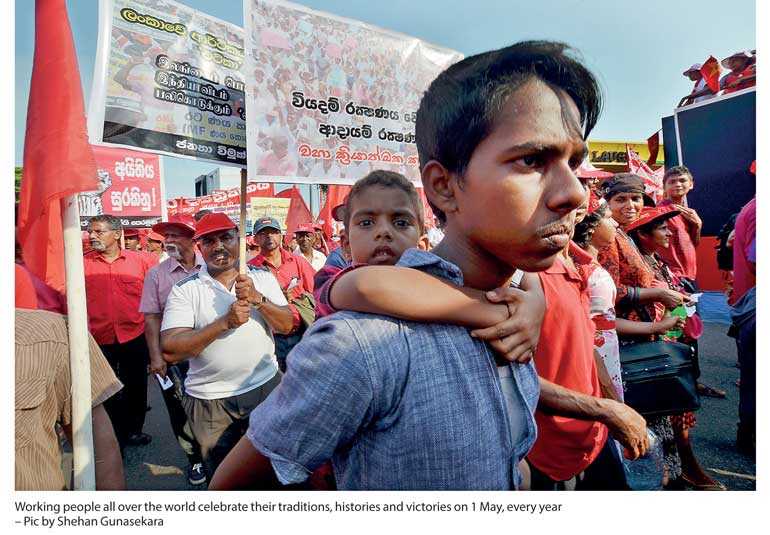Sunday Feb 15, 2026
Sunday Feb 15, 2026
Wednesday, 25 April 2018 00:00 - - {{hitsCtrl.values.hits}}

 May Day was declared a holiday in Sri Lanka in 1956 for the Government sector, bank and mercantile sectors. May Day celebrations have never clashed with the interests of or activities conducted during Vesak celebrations.
May Day was declared a holiday in Sri Lanka in 1956 for the Government sector, bank and mercantile sectors. May Day celebrations have never clashed with the interests of or activities conducted during Vesak celebrations.
Despite this situation and without consultation, the President has unilaterally decided to postpone May Day on the pretext that there will be a ‘Vesak Week’ this calendar year. A gazette notification issued by Home Affairs Minister cancelled the May Day holiday which is due on 1 May.
The President’s postponement of the May Day celebrations in Sri Lanka to 7 May is allegedly because of a request made by Mahanayaka Theros. This is a crass political ploy of exploiting religious sentiment to inhibit protests of the working people by diverting their attention away from the burning issues of the day. Some of the parties and unions who are supposed to represent workers’ interests have already fallen in line with the Government. Others have decided to take their protests to the streets on 1 May, despite a municipal ban on marches.
Overlapping of May Day
with Vesak Day
The issue of overlapping of May Day with Vesak Day has arisen many times previously. The façade of religiosity becomes apparent at times when this occurs. In 1967, the UNP regime postponed May Day celebrations to 2 May. As quoted in news reports, the Communist Party (Peking Wing) opposed it and Maithripala Sirisena supported the Communist Party’s decision. Now he himself is displaying his opportunism by postponing May Day celebrations.
Several trade unions in Sri Lanka have strongly objected to this decision to postpone May Day, emphasising that it is a right of workers to celebrate international workers’ day on 1 May. The JVP has declared that they will go ahead with the May Day Rally but will hold the Colombo rally on 7 May. It is holding its 1 May rally in Jaffna, which is interesting. One could question whether this option is utilised not to confront the issue giving prominence to religion over workers’ rights.
According to the JVP, bringing large crowds to Colombo on May Day for celebrations would become an obstacle for Vesak celebrations that will be held in Colombo. This is not the first time the JVP seems to have wavered on this issue. In 2008, the JVP took the initiative to change the May Day from 1 May due to Vesak celebrations, by requesting the Government to do so.
This year, Vesak Day does not fall on 1 May. The clash is due to the declaration of a Vesak week this year. If the Vesak Week is turned into an annual event, it will be interesting to find out what the JVP position would be. One could easily interpret and equate the JVP position to “killing two birds with one stone”. Thus, they avoid having a May Day rally in Colombo on the May Day itself, despite the relevance of the International Working Day to the working people of the south of Sri Lanka, many of whom reside in Colombo.
Fragmentation
of workers’ unity
When we were released from prison in November 1977, the position of the JVP towards the mobilisation of workers was to organise them in a single workers’ federation, without being concerned of their individual political affiliations. The slogan was ‘One Trade Union for One Industry’. However, this did not materialise and the JVP then formed its own trade union under the banner of ‘Socialist Workers Union’. This fragmentation of workers’ unity along party lines can be seen in many countries including Sri Lanka and India.
In Sri Lanka, workers have joined ranks with capitalist political parties such as the UNP, the SLPP and the SLFP. Even those on the left are associated with and scattered around, many political parties and groups. These political entities, when they were in power directly or as constituents of capitalist ruling coalitions, have violently suppressed many struggles led by the workers and the youth of the country. Sectarianism among trade unions contributes to not having joint May Day events, thus contributing to the weakness of the workers’ movement. This is also one of the factors that has affected the legitimacy of the trade unions in the public eye and has also contributed to the apathy of some sections of the working people.
Workers instead of mobilising independently to safeguard their own interests, are now paying lip service to their cause. Meanwhile the regime is working on the advice and agenda of the IMF and the World Bank by stripping hard-earned workers’ rights, including the eight-hour working day. This situation will not change, until trade unions organise on the basis of ‘One Trade Union for One Industry’ policy. At the same time, the only guarantee for such unity will be to practice democracy within trade unions.
Apparently, one of the main trade unions that allow working people with diverse political views to come together for participative decision making is the Ceylon Mercantile Union that had been previously led by comrade, the late Bala Tampoe. However, despite workers with diverse political views being allowed to join the union, I note that during his long tenure, a solid grip was maintained on the union by the General Secretary till his demise.
Repressive action
Thus, this Government has declared May Day a working day. Furthermore, the Colombo Municipal Council controlled by the UNP has refused to grant permission to hold May Day rallies in public parks in Colombo on 1 May. This is clearly a ban on all May Day celebrations in Colombo.
The sort of repressive action this Government takes against those organising May Day events on 1 May, could very well be on par with the violent repressive action the previous regime took against e workers struggles at the time. As the United States and several other countries had done, the Government of Sri Lanka seems to have come forward to openly curb democratic rights of the working people.
Historic parallels
One could observe historic parallels; when many socialist groups came into being during the latter half of the 19th century. Some of them were political parties and others just choirs. Many socialists were even elected to represent their constituencies. However, big businesses and the state controlled the political process. Seeing that there was no way they could advance for a better future, many rejected the available political space, which had been designed to protect the wealthy. Most of them broke away from political organisations to become anarchists. They stressed the need for worker directed industries and cherished direct action over bureaucratic political processes.
May Day
Working people all over the world celebrate their traditions, histories and victories on 1 May, every year. The socialists and communists of the Second International commemorated the Haymarket Affair in Chicago on the first of May, which became May Day as we know it. It is now a public holiday in many countries with workers around the world including Sri Lanka celebrating May Day with protest rallies and marches. For many millennia, May Day has been a day celebrating rebirth and fertility.
Originally, it was a pagan holiday celebrating the start of summer. May Day is also related to the festival of Flora, the Roman goddess of flowers, and is associated with the spring festivals of the Renaissance, particularly in the northern hemisphere and to this day is celebrated in many cultures. Later, the pagan nature of May Day gave way to a more secular celebration in Europe and North America. In this sense, there is no contradiction or clash between the interests of those celebrating May Day as the International Working Day and those who celebrate it in a cultural manner.
Since the 1880s, it has been recognised as the International Worker’s Day. At the time, working class movements had been fighting for fair working conditions including standardised eight-hour working days and the rights of the trade unions. Under drastic and adverse working conditions, workers had to work 10 to 16-hour days with no holiday provisions. Due to unsafe work practices, death and injury were a commonplace occurrence. During this time, the working class was in constant struggle to gain an eight-hour work day. However, it was only in the late 1880s that organised labour was able to gain sufficient power to declare the eight-hour working day, without the consent of employers.
In 1884, Federation of Organized Trades and Labor Unions (which later became the American Federation of Labor) proclaimed that “eight hours shall constitute a legal day’s labour from and after May 1, 1886.” Many reiterated this proclamation and wished to support it with strikes and demonstrations. Initially, anarchists and radicals thought this was too reformist as it failed to strike “at the root of the evil.”
Despite these hesitations, “an estimated quarter million workers in the Chicago area became directly involved in the crusade to implement the eight hour work day”. With this, the radicals agreed to fight for the eight-hour working day, but with the realisation that greater issues than the eight-hour day existed.
The first May Day celebration
Meanwhile, 1 May 1886 was the first May Day celebration in the world. In Chicago, 40,000 went out on strike. Parades, bands and tens of thousands of demonstrators on the streets illustrated the workers’ strength and unity. Strikers responded to the police beatings by throwing rocks and the police responded with gunfire, killing several strikers and wounding many. The Chicago protests spread across Europe. Yet, many being not aware of this believe it is a day celebrated only by the communists and socialists. Despite this belief, May Day has continued to be associated with the objective of achieving social and economic fairness and justice for all working people.
Socialism became an attractive proposition to workers only at a later stage. The idea of working class control over production and distribution of all goods and services was new and very attractive. They came to the understanding that capitalism worked only in favour of owners of means of production by trading the labour and lives of workers for profit. With thousands of needless deaths of men, women and children at work, life expectancy was as low as early twenties in certain industries. When there was no hope but death and destitution, socialism offered them a humane alternative.
Nowadays workers in the West, coming from many faiths and ethnicities work together to protect the rights of immigrants and asylum seekers. For the past several years, immigration policy has been a focus for mobilising at May Day events. In the modern movement for worker’s rights, immigrants and their supporters march in the streets. Immigration has been compounded by the ruling classes into a divisive political issue; we need to transform it into a human issue.
Lessons from history
History teaches us that people fought for the rights and dignities we enjoy today. There is a lot more to fight for. If we remember that people were shot for us to enjoy the eight hour working day; if we recognise that homes were burnt down for us to have Saturday as part of the weekend; if we recollect child victims of industrial accidents who marched in the streets protesting working conditions and child labour only to be beaten down by the police and company thugs, then only can we understand that our current conditions cannot be taken for granted.
The sacrifices so many people made cannot be forgotten. Otherwise, we will have to fight all over again to gain the very same rights our forbearers won. That is the historical lesson we need to learn when celebrating May Day, which is vital.